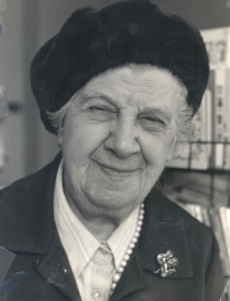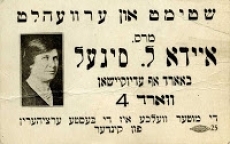Today marks the 100th anniversary of International Women’s Day. This year, the United Nations has chosen “Equal Access to Education, Training and Science and Technology: Pathway to Decent Work for Women” as its theme. In honour of this 100th year, the OJA is profiling an outstanding Jewish woman in Toronto’s history whose ardent support and dedication to education was a life-long focus.
Ida Lewis Siegel (1885-1982) was born to Samuel Lewis and Hannah Ruth (Ticktin) Lewis on 14 February 1885 in Pittsburgh, Pennsylvania. She was the first child to be born in the United States after her parents immigrated from Lithuania. She had two brothers, Abe Lewis and Charles S. Lewis. She attended elementary school in Pittsburgh, and in 1894, she and her family moved to Toronto. On 14 February 1905, Ida married Isidore Hirsch Siegel at the Elm Street Synagogue. Isidore was a travelling salesman, and later, owned a store in Cochrane, Ontario. The family had a home in the Beach area of Toronto where Ida spent most of her time caring for her six children with the aid of her mother.
Communal work was Ida’s calling. She is credited with helping to found a large number of Jewish philanthropic and social organizations including the Daughters of Zion, which was the first ladies' Zionist society in Canada, the Herzl Girls' Club, Hadassah-Wizo Organization of Canada, the Hebrew Ladies' Sewing Circle, which developed into the Hebrew Ladies' Maternity Aid Society, the Y.M.-Y.W.H.A., the Women’s League of the United Synagogues of America in Toronto and many others. In addition, she and her brother Abe formed the first free Jewish Dispensary in Toronto, located on Elizabeth Street in the Ward, which was the forerunner to the Mount Sinai Hospital. Ida was also instrumental in the formation of a unified fundraising body for the Jewish community known as the Federation of Jewish Philanthropies, which would become the current UJA Federation of Greater Toronto. However, she was denied a seat on the executive after campaigning for a female representative.
But it was education that was Ida’s true passion. She was one of the original founders of the Home and School Association in 1919 and formed the first Home and School club for Jewish mothers. She began her professional career with the public school system in 1930, when she became the first Jewish woman to be elected to the Toronto Board of Education, a post which she held for six years. She was later named honorary secretary of the Toronto Bureau of Jewish Education in 1949, serving until 1969. She was honoured by the BJE at its annual Education Dinner in 1955 for her devotion to Jewish learning. Among her many accomplishments, Ida was involved in bringing milk distribution into the public school system for undernourished children and campaigned for better physical and health education curriculum. In 1933, Ida fought for and won the discontinuance of mandatory cadet training in the public schools, both on ideological grounds and because she believed the money could be better spent elsewhere.
Ida was always vocal about women’s equality in education and actively campaigned for the rights of female educators, especially when it came to leadership roles. In an undated letter to the editor of the Toronto Globe newspaper, Ida offered her congratulations to the first woman elected as chair of the Windsor Board of Education, stating that Windsor was “proving itself more broadminded than Toronto.” Ida went on to criticize the Toronto Board for continuously passing up a woman trustee for chair, even though her qualifications were equal to those of the men on the board. “It is up to the women of Toronto to remind those concerned that women now enjoy the franchise and are in line for public office on a merit basis equally with men.”[Letter to the editor, Toronto Globe and Mail, undated. Ontario Jewish Archives, Ida Lewis Siegel fonds 18, correspondence file.] Ida was involved in the field of education right up into her 80s. For ten years during the 1970s, Ida volunteered her time teaching civics classes to immigrant children at the Dewson Street Public School in Toronto. She related her own experiences as an immigrant in Canada and arranged for special field trips for the children.
The OJA holds the personal records of Ida Siegel, including correspondence and memoirs, photographs and records documenting her educational and communal activities.

